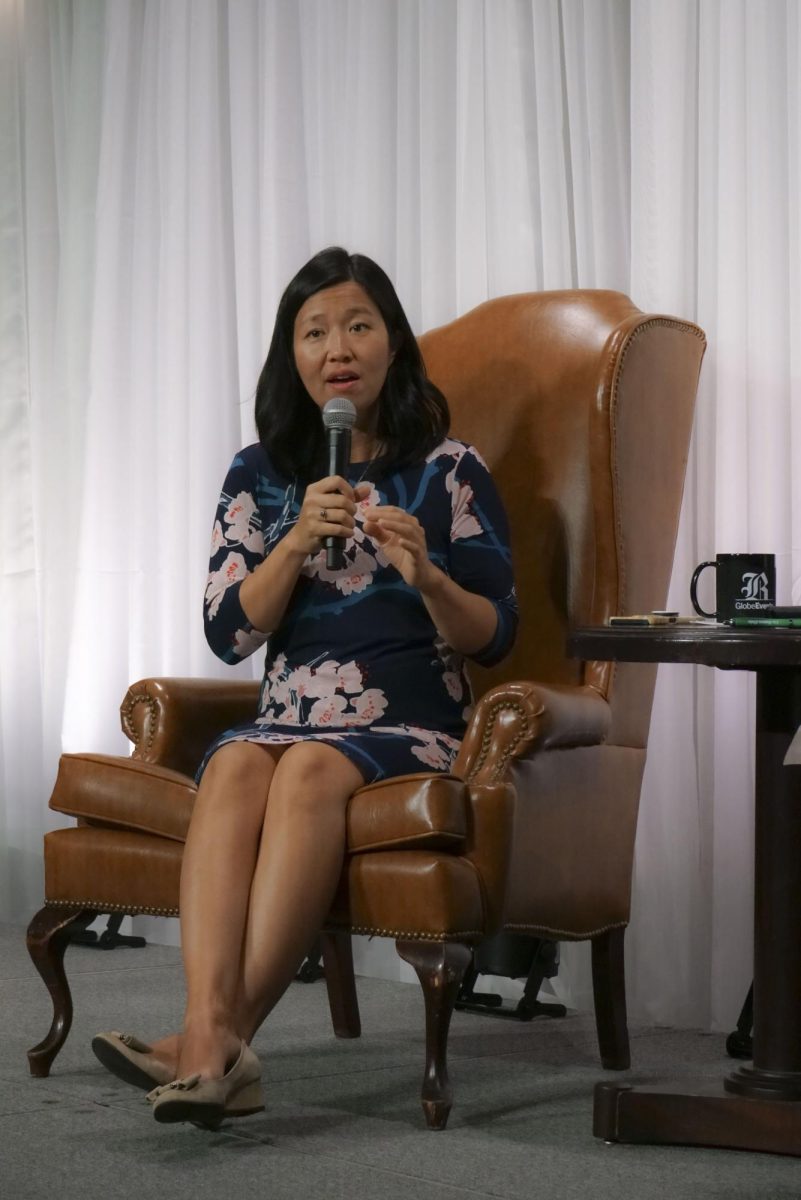Boston Mayor Michelle Wu and Boston Globe reporter Katie Johnston sat down for a fireside chat Sept. 26 to discuss how the city is empowering marginalized communities and changing traditional hiring approaches by placing a higher value on skills over credentials.
Marcelo Suárez-Orozco, chancellor of the University of Massachusetts, Boston, introduced the pair and initiated the conversation, which was part of the Globe’s 2024 Globe Summit. This year, the annual event’s theme was “Boston’s Breakthroughs.”
“How can we ensure that we have the diverse, skilled and adaptable workforce to keep Boston at the forefront of science, technology, the arts and the humanities?” Suárez-Orozco said. Wu’s innovative approach to do so is to find talent within underrepresented communities and bring jobs to them, rather than waiting for someone with traditional qualifications to apply directly.
Wu started this initiative through the creation of the People Operations and Worker Empowerment Cabinets. The goal of these bodies is to not only to bring new talent to city jobs, but also create paths for city employees to develop careers and advance to supervisory roles in the future. The city set up large initiatives, like City Academy, an emergency medical technician and commercial driving license training program, to empower and develop the workforce in a way that will help employees view their jobs with the city as a “career [and] not just one role,” Wu said.
“We were having extreme difficulty staffing school buses with bus drivers, the 911 call center with call takers, different roles in IT or what requires a [commercial driver’s] license to drive snow plows and street sweepers in our public works and street transportation department,” Wu said. “Let’s see this as an opportunity to build from the beginning how we want to think about our workforce.”
To spread awareness about existing employment opportunities, the City of Boston organized hiring days; these “one-stop shops” allow for community members to learn about jobs, be interviewed and get hired on-the-spot. Wu said she believes this plan, in contrast to traditional career fairs, will help “break down the walls” between communities and hiring, and disrupt the belief that city jobs can’t be turned into careers.
Johnston asked Wu if the city has removed the requirement for a college degree for some jobs. Wu said that, because of the nature of civil service positions, there are some qualifications that need to be met for specific positions which inhibits them from removing the requirements.
“It’s a process that we’ve been working with industry partners on as well, … partnering with major employers … and some of the other community organizations,” Wu said. “We are working with them to spread some job descriptions and make them more accessible based on skills or experience, rather than just a resume point or a degree or certain qualification that might not be actually needed for the job.”
With the removal of some nonessential requirements for city jobs, Wu said that there are specific qualities the city looks for during employment depending on the job, ranging from reliability and leadership to management and customer service experience.
According to the skills-based hiring toolkit provided for employers on the state government website, focusing on the job candidate’s skills and experience helps underserved candidates break through the “paper ceiling,” a barrier faced by workers without a bachelor’s degree, which has historically disadvantaged suited candidates from landing positions.
“[Skills-based employment allows] a broader array of people to apply for jobs that maybe wouldn’t be qualified for it if they couldn’t afford to go to college,” Johnston said.
Johnston’s point underscores a broader shift toward economic equity. Skills-based employment not only opens doors for those without traditional credentials but also helps address deeper systemic inequalities.
“Boosting the number of jobs in any community is a win-win. It’s a win for generational wealth and creating opportunity for our residents,” Wu said. “It’s a win for companies that have the growth capacity of being tapped into talent, which is probably the number one driver of where companies are making decisions to go now.”
Wu’s vision goes beyond filling roles, she said. It’s about building generational wealth in marginalized communities and accessing untapped talent while ensuring Boston’s competitiveness and inclusive growth.
Another responsibility in this transition is to provide infrastructure, both housing and transportation, that is affordable and accessible to support the growing population.
Economic opportunity alone isn’t always enough, Wu said — without affordable housing or accessible transportation infrastructure, the benefits and equity that result from skills-based hiring could hinder the desired results. Ensuring that city is organized to adequately serve those with jobs via skills-based employment is critical to representing underprivileged communities in the growing workforce, Wu said.
“We are working very hard … to make sure that people not only want to be here because they have the jobs, but can afford to be here with housing and transportation infrastructure,” Wu said.
Johnston asked if there have been any concerns regarding incoming employees entering the space without the same experience or credentials as other city workers.
Wu responded that the focus of skills-based employment is practical collaboration and results rather than theoretical concerns over qualifications. The People Operations Cabinet confirmed that no reports have been made about concerns regarding this issue.
“We all rely on everyone else in the office to do their jobs, and it’s not at the scale of, ‘Do I think someone is at this level qualification?’” Wu said. “We are sleeves rolled up, getting the work done every single day, and that’s the standard we hold ourselves to.”
The Huntington News is dedicated to serving the Northeastern University community with original, professional reporting and creating an environment in which student journalists can learn from one another. Support an independent, free press at Northeastern University with your donation today.









